
by Jenna | Dec 19, 2017 | Guest Posts
It’s time for another installment of our “Author Insights” series. In this series, I’m introducing you to writers who’ve taken their writing all the way to the finish line of publication, and they share their “lessons learned” with you. There’s nothing quite like learning from a writer who has made to the other side.
Meet Janis Brams, personal essayist and author of The Event
I’m so happy to introduce you to Janis Brams. Janis has been a member of my online writing community since the beginning of 2014, and is a personal essay writer. Over the years of working together through the writing community, I’ve been delighted to watch Janis develop a number of personal essays and pursue getting them published. While she’d had already had pieces published in an anthology and elsewhere, this was a big win for her for a number of reasons, including how unexpectedly satisfying it was for her to be published online.
I asked Janis to share her insights about her writing process and having this essay published.

Janis Brams on Publishing Personal Essays
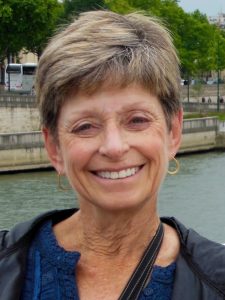
Sometimes we wake up to find our lives racing down a path we haven’t chosen. In March 2014, I opened my eyes to discover Michael, my husband, sitting on our bed unable to speak. The challenges that ensued became the topic for a personal essay I wrote, called, “The Event: Two Perspectives.”
Through the process of writing, revising over time, and finally publishing the essay in July 2017, I learned a number of valuable lessons.
1. Allow time to walk away from emotionally charged writing before declaring it ready for others to see.
I began “The Event: Two Perspectives” soon after my husband suffered his stroke. In many ways, I think the writing process served as therapy, a way to work through my doubts and fears. Although I wrote a number of drafts before declaring the piece “ready-to-go,” I hadn’t allowed enough time to pass between our initial trauma and my decision to submit my essay for publication. After several rejections, I was discouraged and shelved my story until I felt better equipped to deal with such challenging subject matter.
2. Focus on the writing process and not how others might react when reading what you’ve written.
After a year passed, I revisited my essay. At the time, even the title was different, “Perimeters of Love.” I remember thinking the title didn’t work, and I’d included too many paragraphs explaining what I felt instead of showing readers. I also decided I’d provided unnecessary back-story, sharing information that didn’t contribute to the narrative.
I made revisions and then posted the new draft while participating in an online class. After receiving comments on the draft, I made more changes and continued to do so until I felt at peace with what I’d written. Still, I made no move to submit my new “final” draft; something seemed to be missing.
While workshopping my piece, I posted about my progress in the writing community and discussed my hesitancy to submit my latest effort. The members in my group and Jenna, during conference calls, supported my decision to sit with my revised draft longer.
At some point, I recognized that an important part of the story was missing, Michael’s perspective. After all, he’d been impacted most. If I was to share an authentic retelling, we both needed to be heard. Michael agreed to an interview, and I used what he shared to write the second part of my essay, his “Silent Monologue.”
3. Researching where to submit a piece takes a lot of time and emotional energy.
Having researched journals I thought were appropriate venues for this piece once, I was reluctant to initiate that process again. I was working on other stories and felt this was not a good time to move my focus from writing to submitting.
Someone in the writing community mentioned Writer’s Relief, a service that researches venue options for authors and even helps to polish query letters. I decided to pay for their expertise. While I experienced a few glitches, I found them to be responsive when I had questions and easy to work with. They read my essay, sent me a list of twenty-five journals they felt were a good fit along with names of editors, their submission requirements, and other pertinent information.
While I still had to send out my piece, I felt I was using my time wisely, targeting journals that might be better alternatives for my writing.
4. Navigating the acceptance/rejection process presents its own challenges.
After skimming submission guidelines for the journals suggested by Writer’s Relief, I found twenty-two to pursue. I earmarked several days to spend submitting and then waited to see what would happen.
The first seven responses were rejections, but two were what I call “good rejections.” Those journals took time to critique my piece and encouraged me to submit to them again. The editors explained, however, that they disagreed with my decision to include Michael’s perspective and would not be publishing this piece.
I began to question my vision. I shared my doubts with Jenna and my group members in the writing community. They reminded me that this story was mine and suggested that I give myself more time before making any changes. In the end, “The Event: Two Perspectives” found a home. I won’t ever forget how thrilled I was to read “Congratulations” in their email’s first line rather than “I’m sorry.”
Thinking back, next time I submit a story, I may prioritize the list of venues and then stagger my submissions. That way, I’ll have better control over where my work is published.
5. Publishing online was uniquely satisfying.
While I had published in print before, this was my first piece published online. Although having a magazine or journal to hold in my hand was exciting, I realized that more people read my online piece because it was more readily available. All a reader had to do was access the site, and my article appeared. Since my goal for a published piece was to reach as many readers as possible, the online venue was a great option.
6. The replies and comments made in response to my piece reaffirmed my feeling that others would find the topic compelling and that sharing our story was a worthwhile undertaking.
While not everybody who responded to The Event had the same reaction, they felt the need to share what they thought. Most said the topic was difficult for them but appreciated making the journey with Michael and me.
Overall, it was gratifying to hear from readers and have an exchange with them. I was amazed at how many old friends learned about my essay through social media and reached out to share their responses. It was a moving and validating experience because, finally, friends and family who knew I wrote had an opportunity to read something that was mine.

Read “The Event: Two Perspectives”
“The Event: Two Perspectives” is a personal essay written in the aftermath of Janis’s husband Michael’s stroke. The story centers on the first few hours of his “event,” from the time he realizes what is happening to the moment he is airlifted to a University hospital center. The piece is told in two perspectives, Janis’s in the first section, titled “The Storm,” and Michael’s in the second half, called “Silent Monologue.”

About Janis
 Janis Brams has been published in the High Desert California Writers Club Anthology, The California Writers Club Literary Review, Plymouth Writers Group, and a community magazine entitled View.
Janis Brams has been published in the High Desert California Writers Club Anthology, The California Writers Club Literary Review, Plymouth Writers Group, and a community magazine entitled View.
Janis holds two master’s degrees, one in Education from the University of Pennsylvania and one in Writing Composition from CSU San Bernardino.
Janis is an educator, having taught students of all ages for over 25 years. Now retired, she enjoys running, yoga, hiking, travel, spending time with her grandkids, and cooking. She founded a book club in her community that has been meeting for over forty years.
Find Janis’s other work here:
- High Desert California Writers Club Anthologies:
- The California Writers Club Literary Review, Winter 2012-2013, http://calwriters.org/
- Plymouth Writers Group, Anthology for Teachers’ Writing: Lost and Found, Fall, 2003 and Acts of Emancipation, Fall, 2005

* This is an affiliate link, which means Called to Write receives a small commission from any purchases you make using this link, and which we deeply appreciate.

by Jenna | Jan 12, 2017 | Guest Posts
Happy New Year, writers!
We're kicking off a new year here at Called to Write with a new author insights series featuring book giveaways. I'll be introducing you to writers who've taken their writing all the way to the finish line of publication, and they'll be sharing their "lessons learned" stories with you. There's nothing quite like learning from a writer who has made to the other side.
Plus, if you leave a comment at the end of the post before Tuesday, January 17th, you'll be entered to win an autographed copy of the author's book in a random drawing. (You must be located in the United States to win.)
Meet Donna Baier Stein, author of The Silver Baron's Wife
Let me introduce you to Donna Baier Stein. Donna was a member of my writing community in 2012 when she was working on establishing a writing habit to help her complete her first book. And the proof is in the pudding, because, ta-da, her book The Silver Baron's Wife came out in the fall of 2016. So exciting!
I asked Donna to share her greatest insights from writing the novel.
Seven Tips From First-Time Novelist Donna Baier Stein
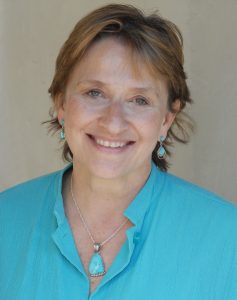 I chose the historical figure of Baby Doe Tabor as the main character of my first novel thinking her fascinating, event-filled, roller coaster life provided its own ready-made plot. I’d been writing stories and knew that my strength was language, not narrative structure. I’d even spent time in two radically different writing groups—one focused on literary fiction (heavy on characterization and language) and one focused on more plot-oriented genre fiction. I, rather arrogantly it turns out, preferred the literary focus. I was definitely a pantser rather than a plotter.
I chose the historical figure of Baby Doe Tabor as the main character of my first novel thinking her fascinating, event-filled, roller coaster life provided its own ready-made plot. I’d been writing stories and knew that my strength was language, not narrative structure. I’d even spent time in two radically different writing groups—one focused on literary fiction (heavy on characterization and language) and one focused on more plot-oriented genre fiction. I, rather arrogantly it turns out, preferred the literary focus. I was definitely a pantser rather than a plotter.
So I decided to write about a woman whose life story had already been the subject of an American opera – The Ballad of Baby Doe – and several other books. There were so many events to choose from her life: her work in the silver mines of Colorado and first marriage to a philandering opium addict, a second marriage to a man worth $24 million when they married at the Willard Hotel in Washington, DC, with President Chester Arthur in attendance, her years writing down her dreams and marking visitations of spirits on her wall calendar at the Matchless Mine in Leadville. All I had to do was write what had happened in Baby Doe (Lizzie’s) life, I mistakenly thought, and voilà, I’d have a novel.
So I started my research. I researched for years, taking occasional stabs at writing early chapters. But the writing of the novel was far less easy than I’d naively hoped it might be. Here’s what I learned from my mistakes:
- A writer can do too much research. I had boxes of hard copy files and dozens of folders on my computer. And in early drafts, I put far too much emphasis on describing the physical details of clothing, furniture, food of the era. I’d say “Bluchers” when saying “boots” would have sufficed, for instance. It was only in the final drafts that I realized I could focus only on the items that the characters came into direct contact with… and see them as they would see them, not as if they were described in a museum catalog.
- Narrative arc is key. I discarded many early chapters about Lizzie’s childhood because they didn’t serve to tell the story I ultimately wanted to tell. I had to choose certain episodes of her life, ignore others, and create new ones in order to show the change in Lizzie I wanted to reveal. The novel, unlike a biography, wasn’t just about re-telling Lizzie’s life. Its purpose was to reveal a theme and a transformation in my main character.
- When writing dialogue, be inside your characters. At first, I felt intimidated by them. How could I talk like a 19th century woman talked? I did find some historically current slang phrases to toss in, but mostly I wrote dialogue as I heard Lizzie and other characters saying it in my head.
- Be inside your characters as they move through a room, too. It was like being an actress on a stage. Instead of seeing Lizzie from an outside view camera, I had to metaphorically go inside her. See what she would notice in the rundown mining cabin in Dogwood or the extravagant villa in Denver. And feel what she might have felt living in such radically different environments.
- For me, writing in first person really helped me inhabit my main character. An agent once told me that third person limited narratives were easiest to sell. I rewrote the book that way and though it came close, it didn’t sell on that go-round. I went back to the first person voice I felt most comfortable writing in, and I’m happy with the result. That was the way I wanted to tell Lizzie’s story from the beginning.
- It’s hard, though certainly not impossible, to give adequate attention to every phase of someone’s entire life. The next novel I write will focus on a much shorter time frame than 81 years.
- Don’t be obsessive about rewriting until you’ve got your story down. I must have rewritten the first pages of the novel fifty times. I thought, mistakenly, that I had to have it exactly right before moving forward. This is not the way to get a novel written.
I’ve already started writing a new novel, and I’m grateful to have the first under my belt. I’m sure I’ll learn new lessons this time, too!
About The Silver Baron’s Wife
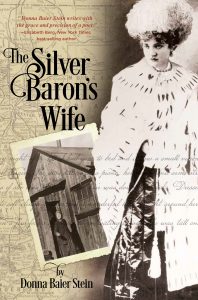 Kirkus Reviews called the The Silver Baron’s Wife “an artistic, sympathetic imagining of the life of a 19th-century woman who made headlines for all the wrong reasons.” Foreword Reviews gave it five stars and said, “A unique portrait of a time and place populated by fearless people, this reimagination of an uncommon woman is powerful.”
Kirkus Reviews called the The Silver Baron’s Wife “an artistic, sympathetic imagining of the life of a 19th-century woman who made headlines for all the wrong reasons.” Foreword Reviews gave it five stars and said, “A unique portrait of a time and place populated by fearless people, this reimagination of an uncommon woman is powerful.”
The Silver Baron’s Wife is available on:
About Donna
 Donna Baier Stein is the author of The Silver Baron's Wife (PEN/New England Discovery Award), Sympathetic People (Iowa Fiction Award Finalist), and Sometimes You Sense the Difference.
Donna Baier Stein is the author of The Silver Baron's Wife (PEN/New England Discovery Award), Sympathetic People (Iowa Fiction Award Finalist), and Sometimes You Sense the Difference.
She founded and publishes Tiferet Journal. She has received a Scholarship from Bread Loaf, a Fellowship from the Johns Hopkins University Writing Seminars, three Pushcart nominations, and prizes from the Allen Ginsberg Awards and elsewhere. Her writing has appeared in Writer’s Digest, Virginia Quarterly Review, New York Quarterly, Prairie Schooner, and many other journals and anthologies.
She is currently completing a new collection of stories based on Thomas Hart Benton lithographs. You can find Donna online at www.donnabaierstein.com.
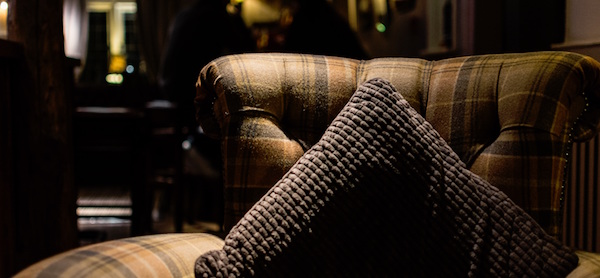
by Jenna | Dec 27, 2016 | Guest Posts
Today we're continuing my "This Writer's Life" series, in which you get to meet some of my community members and take a look inside their writing lives. If you're just joining us, I encourage you to also check out the pieces about Rebecca, Frani, and Rick.
Today we're joined by Foenix Ryder, a writer who found her home in Middle Grade fiction.
Meet Foenix Ryder: A San Franciscan Film Freelancer and Middle Grade Novelist
I've known Foenix for almost two years now. It's been such treat to have her participating in my writing community. She's the kind of writer whose enthusiasm, energy, and positivity is always present, even when the challenges of writing rear up. I love her determination and passion for her writing, and I'm thrilled to be helping her get her words out into the world.
Not only do we work together in the writing community, but I also have the pleasure of coaching Foenix around building her writer's platform. I asked Foenix to tell us more about her writing and what she's learned over the last several years — including how to break down the overwhelming tasks of a major writing project.
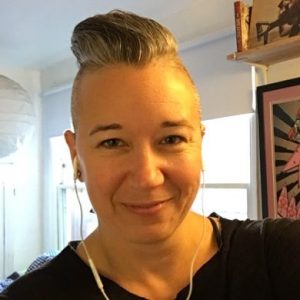 What kind of writing do you do, and where are you in your writing process?
What kind of writing do you do, and where are you in your writing process?
I love Middle Grade and Young Adult stories whether they’re action, adventure, fantasy, coming of age or anything else in those genres. Naturally, that’s what I’m drawn to write: Stories where kids and teens can get immersed and relate -- and hopefully be inspired and encouraged when they read.
Right now I'm on the verge of starting the third draft of my second novel. After struggling for a few weeks with a major element in my story, I realized I needed to pause to study the conventions and expectations of fantasy stories so I can further develop the world I've created and the rules within it.
In some ways it feels like I’m “taking a vacation” from my story and avoiding the work. But I’m reminding myself that I am and always will be developing as a writer. The stepping away to learn more about my genre and craft will only empower me to tell the best story I can. And that’s what we are all here to do.
How has your writing practice changed since you've been in the writing community?
Oh wow... it’s changed immensely! Before the writing community, over the course of six years, I wrote and revised my first novel. It actually still needs a major overhaul, but it was written in bits and pieces, from different places in the story, and most days it felt like I was struggling just to get words on the page.
Since joining the writing community in March 2015, where I was instantly welcomed into a warm community of other writers, my practice has become almost daily. Writing my second novel while in the writing community, I feel like I finally have a rhythm. I create a daily goal, sit down and write, and then check in on the writing community site. I feel grounded and supported by my group every single day, which helped me write the first draft of my second novel in 7 months!
That’s not to say there haven’t been moments when I struggled, but now I have a space with other writers where I can voice my challenges and get encouragement. That helps keep the excitement going when things are great or get it going again when things are difficult.
I also love going to the daily writing sprints where I can jump online, say briefly what I’ll be working on, and completely focus on what I’m working on for one hour. The sprints have created a foundation for me to begin each day while also giving me a moment to think about what I would like to accomplish before diving into the writing.
What have you learned about yourself as a writer ?
I have learned so much over the past seven years I’ve been writing. For instance, I've learned that I do my best writing in the morning, and ideally write from 9 a.m. to 1 p.m. each day.
I've also learned to create a timeline/calendar for myself at the beginning of each draft, section, or when I’m starting something new to help me stay on track. It helps me see how much time I need to accomplish my goal and what I need to get done each day. I have also learned to let go of worrying if someone is going to like my stories or that I don’t write like other writers that I admire. I can only tell my stories as best as I can. And it is my duty to write these stories.
And something huge I am just starting to take in is that I have a tendency to see a project in its enormity and can get overwhelmed thinking I need to get it all done TODAY! But Jenna has helped me see the impossibility of that and instead break things down into much smaller chunks in order to achieve something in a realistic way. This has taken so much stress off of me while helping me accomplish small tasks that add up to a larger piece of the storytelling puzzle.
How much do you write, and where do you typically write?
I have a unique life as a freelancer in the film industry where I sometimes have 12-hour plus days for a few weeks and then I have a chunk of time off. When I’m off, I have time to dive into my writing and be fully present. So when I’m not immersed in “work work” I typically write four hours a day, Monday through Friday. I find it’s the perfect amount of time for me -- anything past 4 hours, I just start to fizzle out.
I write in an artist's studio in the Mission in San Francisco. It’s a private room I share with another artist inside a building where all types of artists have spaces. My half of the room is like a small apartment with a cozy couch, a soft blanket, some china lanterns, and a cool pirate ship kite I recently bought on the beach in Bali.
In order to get into my writing “dreamspace,” I must be curled up into a ball, legs pulled to my chest, body hunched over, blanket around me, with my headphones on playing the constant rumble and downpour of “Thunderstorms.” This allows me to tune everything out except the adventure movie I see inside my head while writing by hand as fast as I possibly can.
What does a successful writing day look like for you?
A successful writing day is one where I have either gotten through the section I wanted to get through, have worked out some kind of problem in my story, or where I wrote so fast, I felt energy flowing through me, writing while the story just poured from me. Those days, I walk away feeling vibrant and excited and truly feel like “I want to live that adventure!”
What's next for you with your writing?
I’m planning to finish my novel mid-2017 and submit my manuscript to agents. Between drafts, I’ve been writing a short story which I’ll revise a few more times and submit to magazines for publication. I feel writing short stories is valuable for me in two ways: First, I get new ideas often and want to get them out into the world so this gives me an outlet for writing something in a shorter timeframe, and second, getting a few short stories published will help me build a brand by getting my stories in front of people who would enjoy reading them.
Also! I’m working regularly with Jenna to create my website and writing platform, building my writing brand around my pen name, Foenix Ryder. Having a pen name helps me maintain the energy I feel when writing my stories.
Community Profile

Name: Foenix Ryder
Roles: Novelist, short story writer, screenwriter, film industry freelancer
Location: San Francisco, California
Genre: Middle Grade & Young Adult Fantasy
Current writing goal: 1) Finish 3rd draft of my current novel by February 2017, 2) Build my writer platform including developing and launching my website by January 2017.
Biggest writing challenge: Working myself out of the stressful mind-numbing boxes of what I "don’t know" about my story.
Biggest writing ah-ha: When it was pointed out to me that I write Middle Grade fiction, it helped me understand my writing better and also see that there is a place for the stories I love to tell and that people of all ages can enjoy them.
Go-to writing platform: Writing by hand, Scrivener
Favorite writing spot: My super cozy writing studio that has a comfy couch and a warm softy blanket.
Bio: Foenix Ryder is a Middle Grade and Young Adult storyteller based in San Francisco, California who tells fantastical stories and lives brave adventures. Foenix’s stories explore diversity, confidence, and self-discovery while taking readers on an action-packed ride.

by Jenna | Dec 25, 2016 | Guest Posts
For your Christmas reading pleasure, today we're continuing my "This Writer's Life" series, in which you get to meet some of my community members and take a look inside their writing lives.
Hopefully the holiday fervor has died down for you now, if you celebrate Christmas, and you'll have a few quiet minutes to read about this inspiring writer, Rick, a Swedish businessman and historical thriller writer who recently completed a major novel revision ... in the dawn hours.
Meet Rikard Bergquist: A Swedish CIO and Historical Thriller Writer
Rikard, whom we fondly call "Rick," has been with the writing community since 2012. Rick is a constant with our group -- always writing, never giving up, even through the ups and downs of a major novel revision. He's just finished his 8th revision and is getting ready to submit his novel to agents after getting some final feedback from his story coach.
You may remember Rick from an earlier guest post when he finished the first draft of his novel after jump-starting his writing habit with five minutes of daily writing. When he joined us he lived in Sweden, but has now moved to Reno, Nevada, where he is working as the CIO of a Swedish startup, raising his family, and writing.
To say that I am gratified by and proud of his achievement is an understatement. Having written alongside Rick for these last four years has been a true gift. It's so easy when we see people reaching major milestones like this and to compare ourselves to them. But when we are right there with them in the trenches, seeing all the challenges, the highs, and the lows, it's just a giant celebration for all of us to see him being ready to start submitting his completed manuscript to agents.
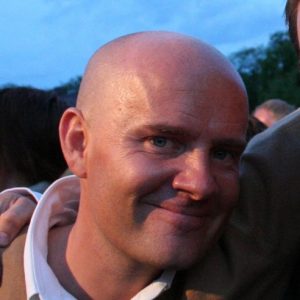 What kind of writing do you do, and where are you in your process?
What kind of writing do you do, and where are you in your process?
When I write it’s mainly fiction but I also do business plans, research grants and business presentations. However, when I refer to writing it is my creative endeavors that I think of. Right now I’m putting the final touches to an historical thriller set in Sweden in the 16th century I’ve been working on for the last five years. I used Storyfix, The Story Grid, and the services of a professional reader in my revision process.
How has your writing practice changed since you joined the writing community?
The writing community taught me about the importance of process and how you can trust that process even when you don’t know where you are or where you’re going with your writing. Keep on writing and roll with resistance. Nearing the finishing of my manuscript I’ve been close to calling it quits a couple of times, but the writing community has gently nudged me forward and pulled me back in. This last year it’s been my happy place when I’ve struggled with the writing. I also feel that Jenna has a set of very hands-on tools to enable me to see through the despair for what it is, handle my resistance, and keep me on track.
What have you learned about yourself as a writer?
Writing is a lonely business and I need my efforts to be seen. Even if not one single person reads my novel, I need someone to share the ups and downs of getting it done with. The writing community provides just that perfect environment of learning about yourself in likeminded company. I’ve learned that writing for just five minutes in a day, isn’t so much about the progress that day, as it is about overcoming the resistance. That is the real achievement and that positive feeling feeds on itself until you’re suddenly writing two hours a day. That’s magic.
Where do you typically write?
I have several places I write in. I feel most comfortable in the places where I can feel undisturbed. I need to be able to shut the world out and go inside of myself. That can be in a café, at my desk a couple of hours before everyone arrives at work, or in the study at home when it’s empty. For some reason I tend to go to busy cafés, where I can look up now and then, and remember that there’s another world waiting for me out there when I’m done.
What does a successful writing day look like for you?
I like to start early, early — preferably in the dark ƒ— and write through dawn. Get my hours in before the rest of the world wakes up. Spending the first hours of the day on writing, gives my a sense of accomplishment and I can hit the rest of the day with a smile on my face. I feel like I’ve put what’s most important to me first.
What's next for you with your writing?
I’m currently outlining part two in my historical trilogy and I hope to have a first draft ready in six months. The big challenge will be going back to first draft mode, after being in the finishing touches phase for the last year. It won’t be long before I miss having a full chapter to revise instead of a empty page to fill. I hope the writing community is ready to roll with my ups and downs once again. (We are, Rick!)
Community Profile
 Name: Rikard Bergquist
Name: Rikard Bergquist
Roles: Writer, CIO in the healthcare industry, father of two girls, skier, hiker.
Location: Reno, Nevada
Genre: Historical thrillers
Current writing goal: Finish first draft of second book in a trilogy before July 2017
Biggest writing challenge: Not falling into a chasm of despair by looking at how far I am from my goal
Biggest writing ah-ha: Stay connected every day with your writing, even for five minutes, this will keep your subconscious in gear to write your story for you.
Go-to writing platform: Scrivener, Word
Favorite writing spot: Early morning, with a coffee, at a back table in a café
Bio: Rikard Bergquist is a historical fiction novelist from Sweden living in Reno, Nevada, who writes in the mornings and works as CIO for a healthcare start-up in the day. He loves the outdoor life and snow of the Sierra, where he fills his creative well skiing and hiking together with his wife and two girls.

by Jenna | Dec 22, 2016 | Guest Posts
Today we're continuing my "This Writer's Life" series, in which you get to meet some of my community members and take a look inside their writing lives. Next up is Frani, an action-adventure novelist who joined the writing community in June of 2015.
Meet Frani Bradley: Psychotherapist and Action-Adventure Novelist
Frani is a psychotherapist who lives in Texas, and has impressed me with her dedication to her writing in the time I've known her. She leaves no stone unturned when it comes to her writing, getting out of her own way, and honing her craft, and she recently undertook a massive life redesign in order to make more time for her writing.
I invited Frani to tell us more about her writing project and how she has created more space by overhauling her life, work, and even her living situation (including a Great Dane!).
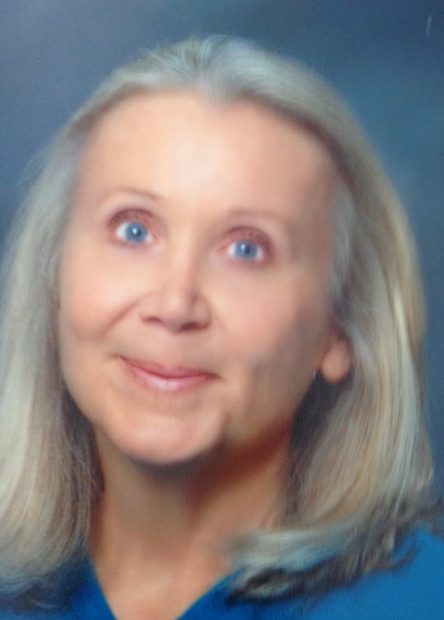 What kind of writing do you do, and where are you in your process?
What kind of writing do you do, and where are you in your process?
I am working on the second in an action-adventure novel series.
Right now I'm waiting for beta readers to finish reading my first novel and entering it into writing contests.
Soon I'll be studying the feedback they give me, and begin the work of incorporating what I want to use.
How has your writing practice changed since you joined the writing community?
I never had a consistent writing habit before I joined the writing community. Before joining the writing community, I had a consistent daily habit of guilt and regret about not writing. Now, most days I feel very good about keeping my daily habit of writing.
What have you learned about yourself as a writer?
I often wondered if I just liked the idea of writing and would never really finish anything, but in the writing community I learned that I am a writer, someone capable of finishing a novel. I owe this to the support of the writing community. Completing my first novel is the manifestation of a dream I've held since I was five years old. I told my grandmother a story, and she wrote it down. It was about a witch who rode a hula hoop rather than a broom. My grandmother said, "Francie, you are a wonderful story teller. Someday you will write a book." She was right.
There are so many levels of happiness and contentment that I have now, seeing my novel in hard copy ready for beta readers. I'm convinced this would never have happened without our group and you, Jenna. So you have literally allowed a life long dream come true. Thank you!
Where do you typically write?
I usually write at my desk at home. Now and then, at a coffee shop with a friend. I also work with my editor online. We collaborate across the internet in real time and over the phone when we're working together on the novel.
What does a successful writing day look like for you?
A successful writing day for me looks like putting in at least two hours of writing time on the suggestions beta readers have made on my first novel, working on my second novel, and studying a book on the craft of writing or doing research. I feel good when I spend at least two hours involved in something writing related.
How have you shifted your life to make more space for writing?
I'm right in the messy middle of changing my life. Over the last three months, working toward the goal of creating more time and mental energy for writing, I have made an effort to streamline my life. In doing so, temporarily I hope, I've created more chaos and extra time and energy drains. Things are winding down now, so I'm beginning to get my sense of humor back about all that has happened. Also, a glimmer of hope has returned, that it's not been madness to try this. I am beginning to see that my writing life could be as I envisioned it in the New Year.
I started by closing my office, where I have had a psychotherapy private practice for nearly twenty years. I opened a home office on October 1st. Moving the furniture, changing my address with managed care companies, deciding suddenly I needed to go paperless, adjusting clients to a new meeting space, and all the many boring details of change have snowballed to create extra work. Meanwhile, my home office needed a new driveway and several other changes to create a good space at home for seeing clients.
I also rented the larger home on my two-acre property to new renters and found myself embroiled in figuring out how to successfully house their large Great Dane in a way that worked for all of us (especially me, at night!).
So needless to say, it's been a bigger project than I'd envisioned. :)
It is December, and seems like much longer than three months since I began the journey of making my life simpler. That sentence really did make me laugh. I am feeling excited right now about how I see things shaping up. My doubts and regrets about starting this are disappearing, and I'm seeing a new writing life forming in 2017. Maybe it's true that "change is messy." It's sure been true for me. In the same moment, I hear the saying, "no guts, no glory" and get happy butterflies.
I'm feeling something wonderful out there with my writing waiting for me to step into it. I can't wait!
What's next for you with your writing?
I plan to continue working on suggestions from beta readers for my first novel, entering it in writing contests, and working on my second novel.
Community Profile

Name: Frani Bradley
Roles: Psychotherapist, Novelist
Location: Corpus Christi, Texas
Genre: Action Adventure
Current writing goal: 1) Incorporate the suggestions of five beta readers into my 1st novel by April 15th and submit to contests, 2) Complete Outline of 2nd novel by January 31st, 3) Complete first draft of 2nd novel by June 1st.
Biggest writing challenge: Keeping boundaries and commitments in regards to writing time
Biggest writing ah-ha: Two people I trust to give honest feedback have read my novel and enjoyed it as a good read. My ah-ha is that I have a novel that two people have enjoyed. It's enough to keep me going a long, long time.
Go-to writing platform: The cloud version of Pages for collaborating with my editor.
Favorite writing spot: In my living room, looking out over an inlet of the Laguna Madre, in the company of my dog and the large water birds in the distance.
Bio: Frani Bradley is an action-adventure novelist based in Texas who writes alongside running her home-based psychotherapy practice. She's a passionate animal lover and has dedicated herself to bringing the spirit of adventure, respect for animals, and spiritual inspiration to her stories.

![]()

 Janis Brams has been published in the High Desert California Writers Club Anthology, The California Writers Club Literary Review, Plymouth Writers Group, and a community magazine entitled View.
Janis Brams has been published in the High Desert California Writers Club Anthology, The California Writers Club Literary Review, Plymouth Writers Group, and a community magazine entitled View.![]()


 I chose the historical figure of Baby Doe Tabor as the main character of my first novel thinking her fascinating, event-filled, roller coaster life provided its own ready-made plot. I’d been writing stories and knew that my strength was language, not narrative structure. I’d even spent time in two radically different writing groups—one focused on literary fiction (heavy on characterization and language) and one focused on more plot-oriented genre fiction. I, rather arrogantly it turns out, preferred the literary focus. I was definitely a pantser rather than a plotter.
I chose the historical figure of Baby Doe Tabor as the main character of my first novel thinking her fascinating, event-filled, roller coaster life provided its own ready-made plot. I’d been writing stories and knew that my strength was language, not narrative structure. I’d even spent time in two radically different writing groups—one focused on literary fiction (heavy on characterization and language) and one focused on more plot-oriented genre fiction. I, rather arrogantly it turns out, preferred the literary focus. I was definitely a pantser rather than a plotter. Kirkus Reviews called the The Silver Baron’s Wife “an artistic, sympathetic imagining of the life of a 19th-century woman who made headlines for all the wrong reasons.” Foreword Reviews gave it five stars and said, “A unique portrait of a time and place populated by fearless people, this reimagination of an uncommon woman is powerful.”
Kirkus Reviews called the The Silver Baron’s Wife “an artistic, sympathetic imagining of the life of a 19th-century woman who made headlines for all the wrong reasons.” Foreword Reviews gave it five stars and said, “A unique portrait of a time and place populated by fearless people, this reimagination of an uncommon woman is powerful.”
 What kind of writing do you do, and where are you in your writing process?
What kind of writing do you do, and where are you in your writing process?
 What kind of writing do you do, and where are you in your process?
What kind of writing do you do, and where are you in your process?
 What kind of writing do you do, and where are you in your process?
What kind of writing do you do, and where are you in your process?